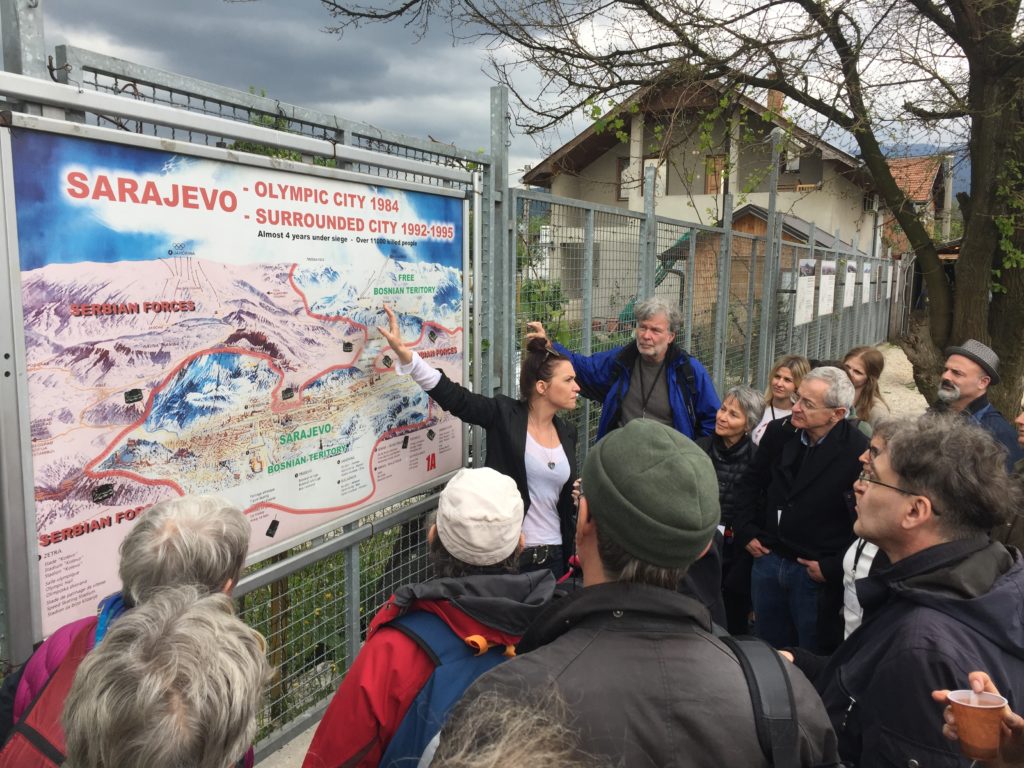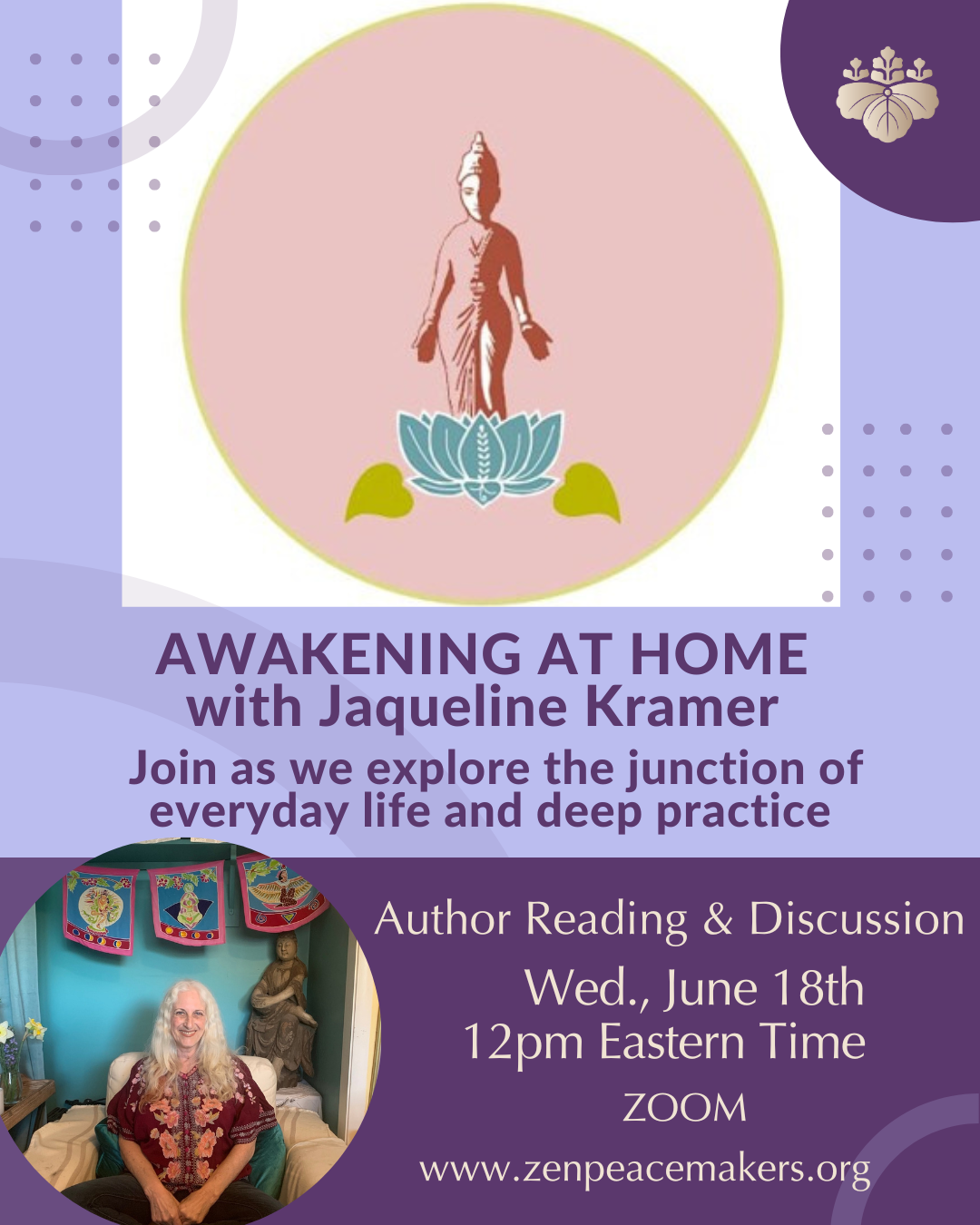SARAJEVO, BOSNIA & HERZEGOVINA. Zen Peacemakers is dedicated to cultivating a multi-national, international and global-spanning awareness in response to the global challenges we face today. One skillful means Zen Peacemakers developed is the Bearing Witness retreat, in which a group of different nationals comes to bear witness to a particular place associated with severe suffering, often genocide, such as Auschwitz-Birkenau in Poland, the Black Hills on Turtle Island (aka USA) and Rwanda. Bearing Witness Retreats reveal how, even though each place of tragedy reflects a unique circumstance, they all share in common universal human experiences – even the tendency to violence can be seen as a source and expression of commonality and connection. Our members have developed other bearing witness retreats of different forms, some bore witness to the Afghan and Syrian muslim refugees in Greece or France, others traced the path of refugees from Northern Africa shoring on the Island of Lampedusa or the arm dealing coast of Sweden.
Several years ago, Zen Peacemakers began collaborating with Vahidin Omanovic and Mevludin Rahmanović, Bosnian peace-builders at Center for Peacebuilding based in Sanski-Most, to plan a bearing witness retreat following the genocide there in 1992-1995. These planning efforts were passed to local European Zen Peacemakers leaders, who brought it all to fruition this past May. In this post, we highlight the stories of four European Zen Peacemakers who attended the retreat.
Zen Peacemakers would like to thank Vahidin Omanovic and Mevludin Rahmanović, Nikica Lubura-Reljic, and Tamara Cvetković and their energetic and youthful staff for hosting us in their beautiful land of Bosnia-Herzegovina. In addition, Zen Peacemakers would like to thank the following people for their leadership and planning: Roshi Frank DeWaele (Belgium), Roshi Barbara Wegmüller (Switzerland), Roshi Cornelius Collande(Germany), Petra Zenryu Hubbeling (Netherlands), Jared Seide (USA), Jozo Novak (Netherlands/Spain/Croatia), Sensei Roberto Mender (Italy), Tani Katz & Iris Dotan Katz (Israel), as well as Zen Peacemakers Lowlands.
Mirko Gaspari, Serbia
„On the day I arrived, after all the activities were over, and just before bed-time, i walked out of the hotel and into the cool, fresh Sarajevan night, intent on taking a stroll in the central, old Ottoman part of town known as Baščaršija. It’s a neighborhood full of people, small shops, restaurants and cafes that all stay open well into the night. i wanted to see how ordinary people – small shop vendors and waiters – would react to my audible Ekavian dialect of our common language. This is something that would immediately give me away as coming from Serbia proper, possibly even that i’m from Belgrade. Bosnians, on the other hand, speak the local language in the Ijekavian dialect. In detecting that i’m from Serbia i could by their reaction also gauge whether – and possibly to what degree – there was any ill-will or hostility towards people from Serbia. In my view, if there was – in many respects it was justifiably so…
“I struck up conversations with three local people – a shopkeeper, a waiter and a random fellow pedestrian (asking her for directions on my way back as i had slightly lost direction). As i spoke to them there was at first this tense little moment when eye contact was made, and of surprise when they realized not only that i was not a local, but that i was from Serbia proper. In all three cases however, to my surprise and relief, after that one awkward moment of tenseness, their eyes opened up wide and they broke into a smile, followed by what seemed like a torrent of friendly words and warm gestures (the woman who gave me directions even took me by the hand and thus pointed out the right way). Everything in their eyes and body language and in their tone of voice, even though nothing to that effect was said explicitly, spoke of ‚Ah, welcome back!‘ … i walked back to the hotel along the cold, fast running, mountain-stream-like Miljacka River, deeply impressed and moved by these simple, unmediated, everyday human encounters. i was so grateful that the capacity of human beings to forgive and renew expressions of benevolence…seemed in that moment to be inexhaustible and everlasting.”
Read Mirko’s full story here.

Georgia von Schlieffen, Germany –
Our group continued to walk to the town of Sarajevo. The sun came out and I enjoyed the different smells and the beauty of the town. I deeply appreciated that different religions were able to coexist peacefully together and that churches had been constructed close to mosques. Something started on that first day that would accompany me throughout the whole retreat; the experience of incredible beauty followed almost instantaneously by stories of horror, suffering, and war. The wounds of the city of Sarajevo were so palpable and visibly raw.[…]
At Veliki Park, I could hardly bear to look at the monument of the man calling out the name of his son and the monument for killed children. The guide explained to us that the footprints one could see on the monument were taken from the siblings of the killed children.A deep inner urge besieged me; I needed a lipstick, a pink one, as I needed to bring a tender form of beauty into all of this suffering. The color pink symbolizes for me a very soft feminine side for me, and I was so glad to get a Bosnian pink lipstick. My practice guided me to my most feminine and vulnerable parts. Never did I have such a longing to wear beautiful clothes and a liking for pastel colors. I have the impression that these deeply feminine and vulnerable parts inside of me want to flourish and be recognized there.[…]
Later Roshi Frank de Waele explained to us with a tender, almost breaking voice the three tenets, and asked us to breathe in and out. What would await us in this present moment? How far could we go in that practice? […]
My cerebral palsy plus an injured ankle due to a fall down the stairs a few months ago made the thought of going on the retreat almost impossible. Besides stories of war and violence, I went through moments of deep and tender vulnerability because I needed assistance with using the restroom. So, Iris, a Zen Peacemaker from Israel, accompanied me, a Zen Peacemaker from Germany, which was difficult for me due to the intimacy of the moment, yet healing at the same time.[…]
In the afternoon, we arrived at the Memorial and UN-compound in Potocari to bear witness to the genocide of Srebrenica where over 8,000 men were executed by Serb forces when they tried to escape from Srebrenica […] I approached Hassan, our guide, who had survived the genocide and the “death march” to Tuzla, and asked him, “Do you feel that it has helped you working here after all what you have been through?” His reply was, “I don’t know.”[…]
The process of singing songs from various countries and traditions comforted and strengthened me. Towards the end of the meeting[…] During the final dinner celebrations I danced with some people […] Everything felt so natural and easy. I didn’t care about my disability anymore.
Read the complete article by Georgia on the Zen Peacemakers blog.

Mikko Iljas, Finland.
…There is suffering on both sides of all arguments. This viewpoint is extremely challenging to maintain in a place like Bosnia.[…]
At first I thought it was a very simple thing. I thought that it was only the Bosnian Orthodox Serbs who inflicted a horrible genocide on the other Bosnian ethnic groups, especially the Muslim Bosniaks. As the information accumulated during the retreat, I became much more aware of the sufferings of the so-called perpetrators.[…]
On our last day in Sarajevo we paid a visit to a center in Eastern Sarajevo that still houses the remains of the roughly 250 Bosnian Serb civilians who were brutally killed and thrown into mass graves. It has been extremely difficult for the Bosnian Serbs to get DNA test results from the international communities, since they had lost the war and it was them who have been sentenced by the International Criminal Tribunal for the former Yugoslavia in Den Haag, Holland. But although the numbers on their side were minuscule compared to the several thousands of Bosniak casualties, it doesn’t matter. All casualties are someone’s father, mother, child or some other dear member of a family. All pain should be treated equal, and people need to be understood, helped, [have] discussions, resolutions, reconciliations, and eventually peace.[…]
The emotions that arose from this experience are complex. There wasn’t enough time to let the massive amounts of information seep in, and bear witness to it. I guess I can call this experience as a plunge into the ethnic conflict and war in Bosnia. For now, I have to bear witness to the emotions that are arising on my own and see what comes up. It is still too early [to tell] what that might be and what actions I might take because of it.
Read Mikko’s full story here.
Evi Ketterer, Switzerland.
How for god’s sake could it still happen? And yet, it happens in Syria right now, in plain sight, in front of all of our eyes. I let my helplessness sink to the bottom of my heart and all I could do was to go out afterwards and lay down on the ground where so many tears were fallen into blood, bones and sweat of fear less than thirty years ago. Where to find comfort? For us in collected grieving, sitting under the beautiful roof of the prayer place at the grave site.[…]
The retreat in Bosnia was hard for me. But the real comfort were the Peacebuilders of the Bosnian group. So young, yet already so wise and so engaged. A grim sense of humor that shocked me at the beginning, but later on I was playful with Amra about it. We often do the same in my palliative care work, when we face death. The kindness of Vahidin, the calm support of Mevludin, all their hospitality to make us feel welcomed and also see the beauty of their country. We saw it in their land, but more by bearing witness to their will to live, to go forward, and in their joy. We saw it in their engagement for building peace although the politics are making the country continuously unstable. And, we saw how our simple interest in how they are doing was so encouraging for them.[…]
What I take home is a quote from Tamara, when they finally told us their religion and ethnic background at the last evening: “My mother is a Muslim Bosniak, my father is an Orthodox Serb, my religion is Goodness.“
Read Evi’s full story here.





Eine Antwort